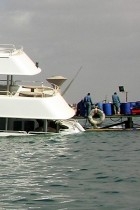
The amount of the salvage fee, as defined in the International Convention on Salvage, 1989, depends on 10 different criteria. Determining factors include the value of the salvaged vessel, the extent to which it was successfully salvaged, the expertise of the salvor, the amount of time they gave up, their willingness to assist and the suitability of the equipment used. The salvage fee charged by a professional salvage company therefore tends to be higher than that charged by the captain of a private vessel.
Hull Insurance & Salvage Cover
At Pantaenius, the terms of our hull insurance cover salvage costs provided the insured vessel is in direct danger of being damaged. However, when it comes to emergency salvage, every yacht owner or captain should be mindful of some basic rules to avoid exceeding the terms of their cover.
The most important rule is never to agree on any salvage fee in advance. Instead you should contact your insurance partner as soon as possible so they can supervise any negotiations. Under no circumstances should you make any statements about the value of the yacht or sign any agreements. The in-house claims department at Pantaenius can be contacted around the clock and is very experienced in handling such situations.
If this is not possible or if a salvor insists on an immediate agreement, Pantaenius recommends that you use the Lloyd's Open Form (LOF) agreement. This standardised agreement does not specify a salvage fee and contains a 'no cure – no pay' provision. Once the vessel has been successfully salvaged, the remuneration will be decided later by an arbitral tribunal.
Correct Conduct in the Event of Salvage
-
Contact your insurance partner as soon as possible
-
Do not sign a salvage agreement. If you have to, use only Loyd’s Open Form (LOF)
-
Do not agree a salvage fee or make any statements about the value of your yacht
-
Contribute to the salvage as much as you can
-
Make notes or records of the precise circumstances and the duration of the salvage
10 Criteria for the Assessment of a Salvage Award
-
Value of salvaged ship and all property preserved
-
Competence and efforts of salvor to prevent environmental harm
-
Extent of success of salvor
-
Circumstances and extent of danger
-
Competence and effort of salvor for safe guarding vessel/property and for saving life
-
Spent time and effort and loss
-
Liability and other hazards
-
Promptness of salvage service
-
Availability and assignment of boats
-
Availability and capability of equipment
About Pantaenius
Pantaenius has acted as an Insurance Broker since 1899, providing Yacht Insurance since 1977, with offices in Germany, United Kingdom, Monaco, Spain, Denmark, Sweden, Austria, America and Australia.



Post your comment
You cannot post comments until you have logged in.
Login to post a commentComments
No one has commented on this page yet.
RSS feed for comments on this page | RSS feed for all comments